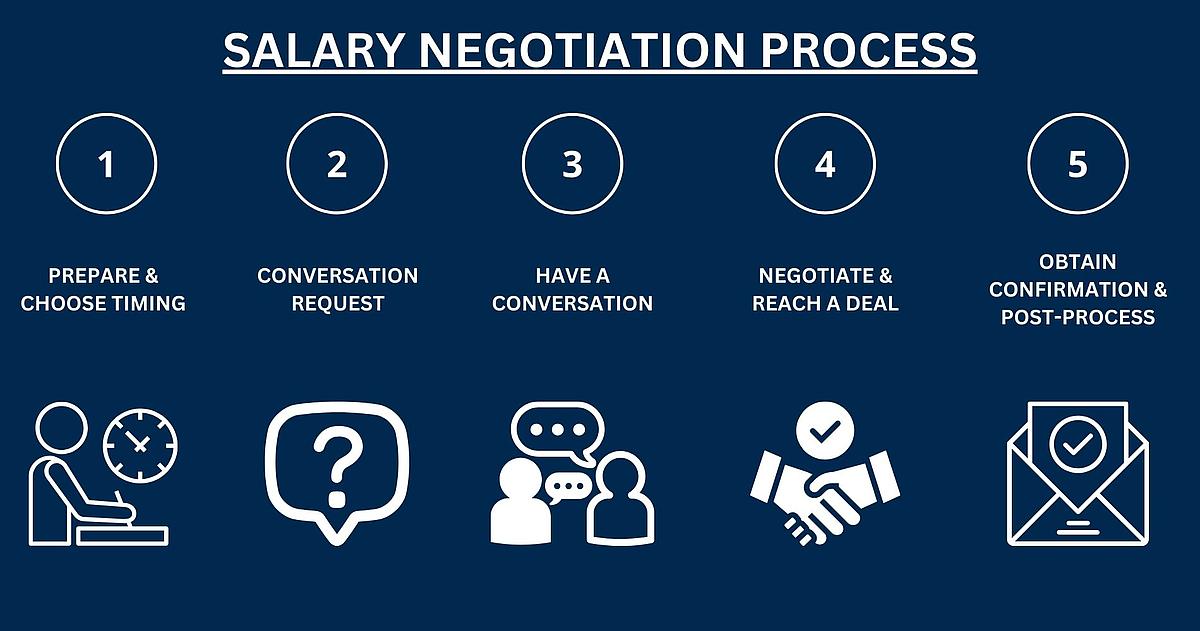This Website uses cookies to improve your visit on our website. More Info
Mastering salary negotiations: these tips will maximize your starting salary
A successful salary negotiation can be crucial for your career development and financial satisfaction. It's not just about recognizing your achievements and skills, but also about valuing your role in the company. However, the process can be challenging, especially if you don't know how to approach it. In this article, we provide tips and arguments that you can use to significantly increase your chances of a successful salary negotiation.
Why should you conduct a salary negotiation?
Salary negotiations are important because they provide an opportunity to properly reflect the value of your work and ensure that your salary is commensurate with your performance, experience and market conditions. They help to ensure fair compensation and increase motivation and job satisfaction. They also allow you to be recognized for your contributions and progress within the company. Salary negotiations are also a means of addressing inequalities and ensuring that all employees are treated fairly and equally. They provide an opportunity to discuss career goals and how these can be aligned with the company's objectives.
How to prepare for a salary negotiation?
To prepare for a salary negotiation, you should consider the following steps:
- Research market value: Find out the standard industry salary for your position in your region. Use salary databases, industry reports and networks to do this.
- Document your own achievements: Gather evidence of your accomplishments, achievements and additional responsibilities that you have taken on since your last salary adjustment or that you accomplished prior to this new job.
- Clearly define goals: Determine what salary you want to achieve and also consider what other compensation or benefits are negotiable for you (e.g. flexible hours, continuing education).
- Formulate arguments: Prepare convincing arguments as to why you deserve this salary. Refer to your achievements and the market value of your position.
- Practice the interview: Practice the interview with a friend or family member to get feedback on your reasoning and demeanor.
- Flexibility and alternatives: Be prepared to be flexible and have alternatives in mind in case your employer is not able to fully meet your salary expectations.
- Maintain a professional attitude: Approach the interview with a positive and professional attitude. Be prepared to listen and respond to the other person's suggestions.
Good preparation will give you the confidence and arguments you need to successfully conduct your salary negotiation.
If you would like to do a Salary Check before your Salary Negotiation, please visit our dedicated page for more information on this topic!
Salary Check PageSalary negotiation process
A structured approach will help you go into a salary negotiation confident and well prepared, and increase your chances of a successful outcome. Here are the usual steps in the salary negotiation process.
Overview of the usual salary negotiation process
The following diagram provides a brief overview of the usual course of a salary negotiation.

The salary negotiation process explained in more detail
The salary negotiation procedure can be broken down into several steps to make the process systematic and successful:
Preparation
- Determine market value, document performance and set targets: Proceed as explained above.
Choose timing
- Choose a suitable time for the interview, for example following a successful project implementation or during the annual performance reviews.
Request a meeting
- Request a formal meeting with your line manager to discuss your career development.
Conduct the conversation
- Introduction: Start the interview on a positive note by expressing your commitment to the company and your excitement about your role.
- Present your achievements: Highlight your achievements and the added value you bring to the company.
- Express your salary expectations: Present your salary expectations based on your research and performance.
- Present arguments: Back up your claim with data and examples of your work.
Negotiating
- Be prepared to respond to counter-arguments and negotiate flexibly. Also consider alternatives to a salary increase, such as bonuses or additional vacation days.
Find a conclusion
- Come to an agreement, or agree to continue the discussion at a later date if an immediate decision is not possible.
Written confirmation
- Ask for written confirmation of the agreed new salary or conditions discussed to avoid misunderstandings.
Follow-up
- Reflect on the interview and plan any next steps if the outcome does not meet your expectations or if further negotiations are necessary.
How much can you ask for in a salary negotiation?

The negotiation base in a salary negotiation refers to the starting point of the salary request, which should be based on sound reasoning. This basis is determined by a combination of your current salary, your benefits, the salaries of comparable positions in your industry and region, and the particular skills or qualifications you bring to the table. It's about finding a realistic and justifiable amount that reflects your appreciation for your work while taking into account the range of what your employer is willing and able to pay.
Typically, a premium of 10% to 20% on the current salary is considered appropriate. However, this range can vary depending on factors such as your professional experience, the industry you work in and the location of your company. In some cases, especially if you are underpaid or have added significant value to the company, higher demands may be justified.
It's important to be prepared for the fact that your employer may want to negotiate, so it's advisable to start with a slightly higher demand to leave room for compromise. At the same time, you should remain realistic and support your request with clear evidence of your performance and the market value of your position.
DID YOU KNOW?:
The best arguments for a higher salary are an excellent education and further qualifications. MBS offers the MBA (Master of Business Administration) for such situations, which provides a good basis for negotiating a higher salary. The MBA of Munich Business School is the top program for (young) professionals who want to take their career to the next level.

When is the right time for a
salary negotiation?

It's the perfect time for a salary negotiation:
| In the case of a new job | The ideal time to negotiate your salary is before you sign the employment contract. After you have been offered a job, but before you accept, you have the opportunity to negotiate the salary. At this point, the company is already convinced of your suitability and may be more open to negotiation. |
|---|---|
| After apprenticeship | If you have just completed your apprenticeship or study and accepted a job, this is a good time to negotiate your starting salary. Your newly acquired qualifications and knowledge can increase your value to the company. |
| During performance reviews | Many companies conduct regular performance reviews, often annually. These provide a natural opportunity to discuss salary increases, especially if your performance is above expectations. |
| After taking on additional responsibility | If you have taken on significantly more responsibility or new tasks without your salary being adjusted, this is a strong reason for a salary negotiation. |
| If your qualifications have increased | Further training, certificates or relevant courses can increase your market value. After acquiring such qualifications is a good time to talk about adjusting your salary. |
| If the market situation has changed | If salaries in your industry have generally increased or there is a shortage of skilled workers, this may be a good time for a salary negotiation as your market value has increased. |
The right time for a salary negotiation depends on several factors and varies depending on the situation.
Salary Negotiation: The most common Mistakes and best Tips
It's not uncommon for even the most experienced professionals to make mistakes that hurt their chances of a successful salary negotiation. In this context, being aware of both tried and tested tips and common pitfalls is invaluable.

Common mistakes in salary negotiations
- Insufficient preparation: Going into the interview without market research and clear arguments.
- Wrong time: Scheduling a salary negotiation in difficult economic times or directly after a failure.
- Citing personal reasons: Using financial needs as the main argument.
- Being too aggressive or emotional: This can scare off the negotiating partner.
- Accepting the first offer immediately: This leaves potential room for negotiation untapped.
- Not thinking beyond the salary: Overlooking additional services and benefits such as additional vacation days.
- Setting ultimatums: This can put a strain on the relationship with the employer.
- Setting your salary too low: Selling yourself short by stating salary expectations that are too low.
- Compare with colleagues: Salary negotiations should be about your own performance. Referring to others can lead to tension and damage the professional atmosphere.
Tips for a successful salary negotiation
- Be specific: Give me a precise figure based on your market research rather than a vague range.
- Practice your presentation: Practice the interview in advance to gain confidence in your argument.
- Stay professional: Conduct the conversation in a constructive and professional manner.
- Consider the total package: In addition to the base salary, other benefits such as bonuses, vacation days or flexible working hours may also be negotiable.
- Be prepared to negotiate: Come into the conversation with an open mind, and be prepared to find compromises.
- Use positive language: Avoid negative language and focus on positive aspects of your work and how you contribute to the company's success.
TIP #1 FROM THE PRO: ALWAYS HAVE A PLAN B
In concrete terms, this means that you should always have other offers and salaries in mind and feel free to include them in the interview. For example, you can refer to other employers you have applied to who would offer you more or you can mention the salaries of friends who work in other companies in the same industry. It is important that you do not bluff or threaten. Always be friendly and calm. Of course, it is also helpful to have a plan B for certain arguments and other situations during the conversation.
Salary Negotiation: Arguments
The arguments with which you go into a salary negotiation are the most important points you should prepare. These pave the way to a higher salary if you use them correctly. Good arguments focus on your value and contribution to the company as well as objective market comparisons, while bad arguments use personal needs or inadequate comparisons that have little to do with your professional performance. Here is a table that compares good and bad arguments for a salary negotiation:
| Good Arguments | Bad Arguments |
|---|---|
| Demonstrable performance improvements and goals achieved | Personal financial needs (e.g. mortgage, debt) |
| Assumption of additional responsibilities | Salary of a colleague, without reference to own performance |
| Standard market salaries for comparable positions | Length of service, without performance improvement |
| Special qualifications and further training acquired since the last salary adjustment | Threat of leaving the company without a concrete offer |
| Positive feedback from customers or colleagues | Dissatisfaction with the job, without proposed solutions |
| Contribution to increasing profits or reducing costs in the company | Comparison with salaries outside the industry |
How to deal with counterarguments in salary negotiations?
Dealing with counterarguments in a salary negotiation is a key component to success. Here are some strategies to respond effectively:
Listening and understanding
Listen carefully without interrupting. Fully understand the counter-argument before you answer. This shows respect and willingness to cooperate.
Stay positive
Maintain a positive attitude. Avoid defensive or aggressive reactions that could make the negotiation unnecessarily difficult.
Show empathy
Recognize the other person's perspective. By showing empathy, you build a bridge for a constructive discussion.
Use facts
Answer the counterarguments with facts and data. Use the information you have prepared about your performance and the market value of your position as the basis for your argument.
Show flexibility
Be open to compromise. If a direct salary increase is not possible, explore alternatives such as bonus payments, additional vacation days or training opportunities.
Offer solutions
Present solutions that take into account both your interests and those of the company. For example, this could be a staggered salary increase linked to specific performance targets.
Ask for further feedback
If counter-arguments are based on specific weaknesses or areas for improvement, ask for specific feedback and develop a plan to address these points.
Suggest next steps
If no agreement can be reached, suggest continuing the conversation at a later date after both sides have had time to reflect on the discussion.
Stay professional
No matter how the conversation goes, maintain professionalism and gratitude for the opportunity to discuss.

By applying these techniques, you can effectively handle counterarguments in a salary negotiation and continue to actively work towards a solution that is satisfactory for both sides.
Helpful Tricks for Effective Salary Negotiations
In the art of salary negotiation, little tricks and hacks can make a big difference and often make the difference to a successful outcome. Armed with these helpful tricks, you'll not only start your next salary negotiation with more confidence, but also maximize your chances of getting the success you want and deserve.
- The sandwich technique: Start and end the conversation with positive aspects of your work, and place your salary demand in between.
- Use a precise number: Specific numbers seem more thoughtful than round amounts.
- Pause after your proposal: This gives your counterpart time to think about what you have said.
- Signal flexibility: Show that you are open to different forms of compensation.
- Use the principle of reciprocity: Be prepared to make concessions in order to create a positive dynamic.
- Framing: emphasize your demands in the salary negotiation as benefits for the company.
- Say salary adjustment instead of salary increase: This could sound less harsh and encourage friendly communication, but at the same time already point out your achievements.
- Prepare for counter-arguments: Have answers ready for possible objections.
- Positive self-marketing: Emphasize how you will contribute to the company's success in the future.
FAQ
In salary negotiations, it is common to ask for between 10% and 20% more than the current salary. However, the exact amount may depend on the industry, experience, position and market conditions. It is important to set realistic expectations and to be well informed about the salary ranges in your field and region.
In a salary negotiation, you should base your arguments on your contribution to the company, your achievements, skills and the market value of your position. Emphasize particular achievements, responsibilities you have taken on and how you have contributed to the growth and success of the company. Also compare your salary to industry salaries to support your claim. Further training and additional qualifications that you have acquired since your last salary interview can also be strong arguments.
Conducting a salary negotiation requires preparation and strategy. Start with thorough research to justify your salary expectations based on your contribution to the company, experience, qualifications and industry salaries. Choose an appropriate time, such as during a performance review meeting or after successfully completing a large project. Communicate clearly and confidently your achievements and the value you bring to the company. Listen carefully and be prepared to respond flexibly to counter-offers, for example by negotiating additional benefits such as further training or flexible working hours. Remain professional and positive throughout the interview.
Salary negotiations are particularly appropriate if you have made significant achievements, during regular performance reviews, after you have taken on additional responsibilities, or if your qualifications have improved significantly through further training. Even if the market has changed and your salary is below the industry norm, this is a good time. Another opportunity is when you move to a new position within the company or when you accept a new job offer.
To approach a salary negotiation, ask for a formal meeting with your manager, expressing a desire to discuss your career development and compensation. Emphasize that you want to discuss your contribution to the company and how you can achieve future goals together. Be professional and direct, but not demanding. It is helpful to link this request to positive aspects of your work and your motivation for the future to keep the conversation on a constructive track.
Interested in a study program? Request our information material now!
More exciting degree programs in Munich













